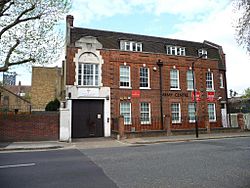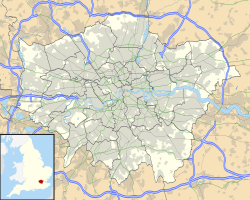Braganza Street drill hall facts for kids
Quick facts for kids Braganza Street drill hall |
|
|---|---|
| Kennington, London | |

Braganza Street drill hall
|
|
|
Location within London
|
|
| Coordinates | 51°29′15″N 0°06′10″W / 51.48748°N 0.10278°W |
| Type | Drill Hall |
| Site history | |
| Built | 1865 |
| Built for | War Office |
| In use | 1865-Present |
The Braganza Street drill hall is a special building in Walworth, London. It has been used by the military for a very long time. This building serves as a training and administrative center for army units.
Contents
History of Braganza Street Hall
The story of the Braganza Street drill hall began in 1833. It was originally two houses on a street then called New Street. In 1865, a group called the 19th Surrey Rifle Volunteer Corps bought these houses. A "Volunteer Corps" was a group of ordinary citizens who trained to help defend their country.
Early Military Units at the Hall
Over the years, the 19th Surrey Rifle Volunteer Corps changed its name several times. In 1883, it became the 4th Volunteer Battalion, Queen's (Royal West Surrey Regiment). Later, in 1908, it was known as the 24th (County of London) Battalion (The Queen’s). These changes show how military units often reorganize over time.
World War I and Rebuilding
When World War I started in August 1914, soldiers from this battalion gathered at the drill hall. They were "mobilised," meaning they were prepared for active service. Soon after, they were sent to the Western Front, a major battle area in France and Belgium.
In 1937, the London Regiment, which included this battalion, was reorganized. The unit at Braganza Street became the 7th (Southwark) Battalion, the Queen's Royal Regiment (West Surrey). The drill hall itself was greatly rebuilt and made larger around this time. In 1938, the Duke of Gloucester, a member of the British Royal Family, officially opened the improved building.
Post-War Changes and Modern Use
After World War II, the military unit at the drill hall changed its role. In 1947, it became an artillery unit. This new unit was called the 622nd Heavy Anti-Aircraft Regiment, part of the Royal Artillery. "Artillery" refers to large guns used in warfare. "Anti-Aircraft" means they were designed to shoot down enemy planes.
Later, the Royal Artillery reorganized, and this unit moved out. In 1967, a new type of unit moved in: a "field hospital." This was the 217 (London) General Hospital, part of the Royal Army Medical Corps. A field hospital is a mobile medical unit that provides care to soldiers, often close to battle zones.
In 1995, this field hospital joined with other hospitals. They formed a larger unit called 256 (City of London) Field Hospital. Today, the Braganza Street drill hall serves as the main office, or "regimental headquarters," for this important medical unit.


